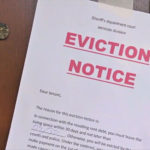A reference of Rhode Island Eviction Laws, and steps of the Rhode Island eviction process for landlords and renters, updated 2021.
- What are the reasons fro eviction under Rhode Island eviction laws?
- Nonpayment of rent (R.I. Gen. Laws § 34-18-35)
- Illegal activity (R.I. Gen. Laws § 34-18-36)
- Non-compliance with the lease agreement (R.I. Gen. Laws § 34-18-36)
- Tenant remains in possession of the rental unit after the lease term without the owner’s permission ((R.I. Gen. Laws § 34-18-37)
- What notice do Rhode Island eviction laws require that landlords provide tenants before starting the eviction process?
- For evictions based on non-payment of rent, the landlord must provide a 5-day notice. This notice is served after a 15-day grace period to pay the rent has passed. The notice must state that the rent is now more than 15 days has passed and the eviction will occur if rent is not paid within 5 days. (R.I. Gen. Laws § 34-18-56(a)).
- For evictions based on non-compliance with the lease agreement, the landlord must provide a 20-day notice to the tenant. The notice must state the nature of the breach and what the tenant must do to correct it to avoid eviction. If the tenant breaches the lease again within six months, the tenant will not have the right to cure the breach. (R.I. Gen. Laws § 34-18-56(b)).
- If the tenant commits illegal activity related to a controlled substance on the property or a violent offense, the landlord must provide a notice of 20 days. The tenant will not have the right to cure the breach. (R.I. Gen. Laws § 34-18-56(b)).
- For evictions based on remaining in possession of the rental unit beyond the period of the lease without the owner’s permission, the landlord must provide a notice of 10-days for a week-to-week tenancy. For a month-to-month tenancy, the landlord must provide a 30-day notice. For a year-to-year lease, the landlord must provide notice of at least three months. The eviction notice must instruct the tenant to vacate the property and remove their personal property by the date indicated on the notice. (R.I. Gen. Laws § 34-18-56(c)).
- Do Rhode Island eviction laws allow landlords to use “self-help eviction” methods, such as locking a tenant out of the rental unit or shutting off the utilities?
- No. Rhode Island law prohibits self-help measures. If the landlord removes or excludes the tenant from the property or interrupts essential services to the rental property, the tenant can recover damages up to three times the actual damages or three months’ rent, whichever is greater, along with attorney’s fees. (R.I. Gen. Laws § 34-18-34).
Eviction Process in Rhode Island: Step-by-Step
The eviction process in Rhode Island involves the following steps:
- The landlord serves the eviction notice. The landlord must give the eviction notice to the tenant. The notice must be in writing and must be mailed to the tenant.
- The landlord waits for the tenant’s response to the eviction notice. The tenant has a right (in most cases) to cure the breach by remedying what they did wrong or paying past-due rent. The landlord cannot take any further action during this waiting time.
- The landlord takes legal action. The landlord begins the official eviction process in Rhode Island by filing an eviction for non-payment of rent or eviction for noncompliance with the rental agreement.
For an eviction for non-payment of rent, the complaint must state:
- Plaintiff is the owner or landlord of the premises listed above where the tenant currently resides
- The tenant is more than 15 days late in rent, the amount of rent, and the term rent must be paid
- The total amount due as of the date of the drafting of the complaint
- The landlord served the 5-day notice as required by law and attached a copy of it to the complaint.
- The date the landlord mailed the notice.
- The tenant has not paid the rent and remains in possession of the rental unit.
- The landlord requests a judgment for possession of the premises and for back rent in the amount indicated on the complaint.(R.I. Gen. Laws § 34-18-56(d)).
For evictions based on non-compliance with the rental agreement or unlawfully holding over the unit after expiration or termination of the tenancy, the complaint must state:
- Plaintiff is the owner or landlord of the premises listed above where the tenant currently resides
- The tenant breached their obligations under the rental agreement as set forth in the attached copy of the notice
- The landlord mailed the notice to the tenant.
- The tenant has not cured the breach.
- The date the landlord mailed the notice.
- The tenant has remained in possession of the property.
- The tenant has not paid the rent and remains in possession of the rental unit.
- The landlord requests a judgment for possession of the premises and for the amount of whatever amount claimed and what the amount is for. (R.I. Gen. Laws § 34-18-56(e)).
The landlord also has a summons issued that explains legal action has been taken against the tenant, lists the court, address, and hearing date, instructs the tenant they have 20 days to provide an answer, and informs the tenant that a default judgment will be entered against them if they do not respond to the complaint. (R.I. Gen. Laws § 34-18-36)
- The landlord serves the tenant. The landlord must have the tenant legally served. The tenant has 20 days to respond to avoid a default. The tenant can also avoid eviction if they pay the back due rent in full, if applicable.
- Parties attend the eviction hearing. The parties attend the hearing and present their case. The court rules in one of their favor. If the court rules in the landlord’s favor, the tenant has 5 days to vacate the property or appeal.
The landlord requests a writ of execution. A writ of execution gives the tenant a specific date by which they must leave the property and remove their belonging. The landlord provides the writ to the sheriff who can use it to forcibly remove the tenant.







